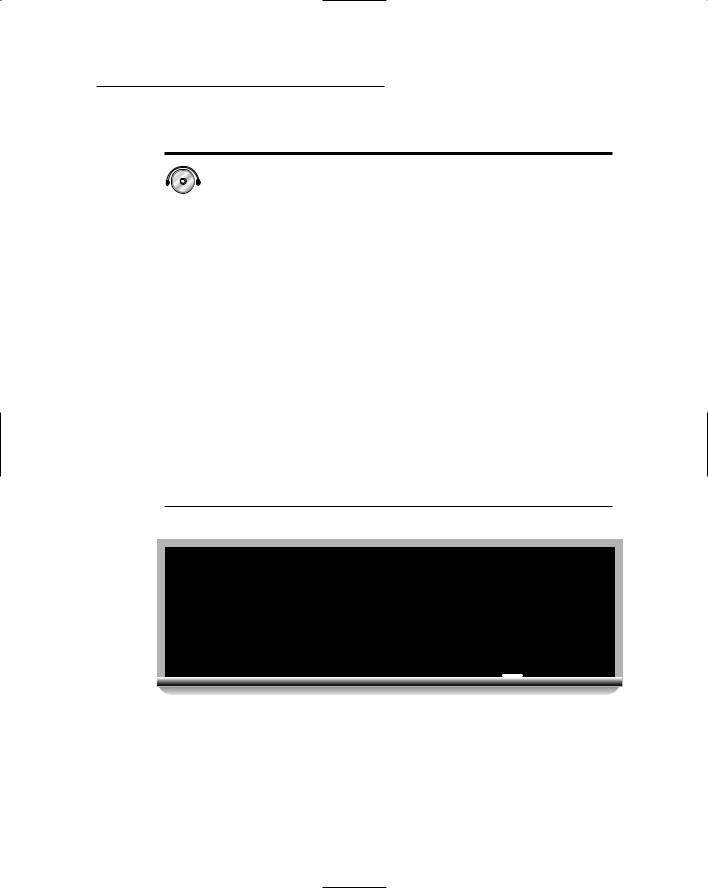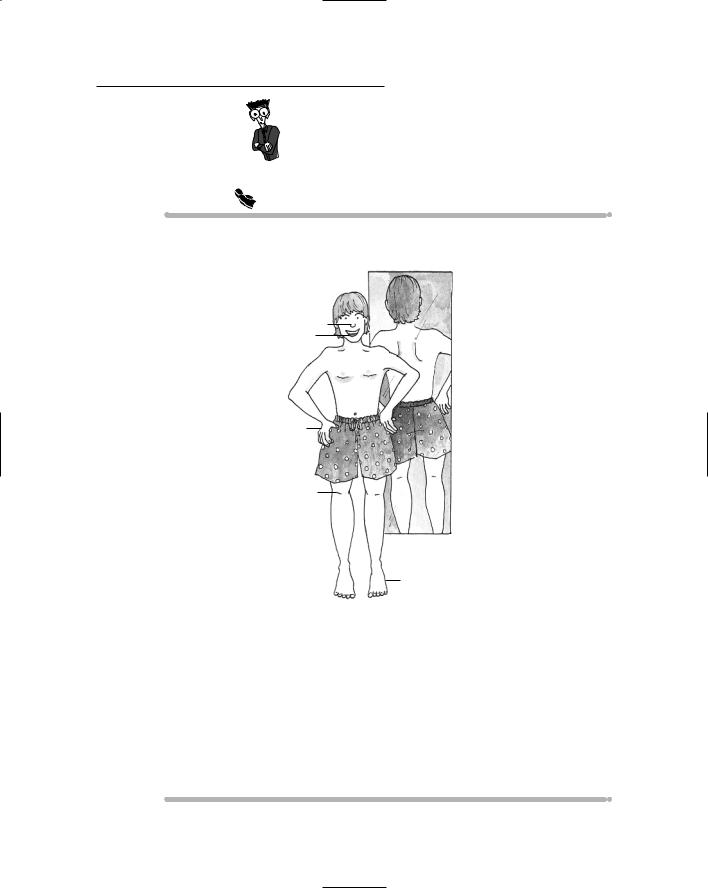
Arabic_for_Dummies
.pdf
286 Part III: Arabic on the Go
Getting Medical Help
If you’re like me, you may find that even though going to the doctor’s office is necessary and important, it isn’t always the most fun part of your day. But visiting the doctor is essential for each and every one of us. This section introduces you to important medical terms to help you interact effectively with medical staff.
Locating the appropriate doctor
In case of a medical urgency, your first stop should be the mustashfaa (moos-tash-fah; hospital) to see a Tabiib (tah-beeb; doctor). If you simply need a checkup, go see a Tabiib ‘aam (tah-beeb ahm; general doctor). If your needs are more specific, look for one of these specialist doctors:
Tabiib ‘asnaan (tah-beeb ahs-nan; dentist)
Tabiib ‘aynayn (tah-beeb ah-yeh-nayn; ophthalmologist)
Tabiib rijl (tah-beeb ree-jel; orthopedist)
Tabiib ‘aTfaal (tah-beeb aht-fal; pediatrician)
Talking about your body
Locating the right doctor is only the first step toward getting treatment. In order to interact with the Tabiib, you need to be able to identify your different body parts in Arabic, explaining which parts hurt and which are fine. Table 16-1 lists all your major body parts.
Table 16-1 |
Body Parts |
|
Arabic |
Pronunciation |
Translation |
jasad |
jah-sad |
body |
|
|
|
ra’s |
rahs |
head |
|
|
|
fam |
fahm |
mouth |
|
|
|
lisaan |
lee-sahn |
tongue |
|
|
|
‘asnaan |
ass-nahn |
teeth |
|
|
|
wajh |
wah-jeh |
face |
|
|
|

Chapter 16: Handling an Emergency 287
Arabic |
Pronunciation |
Translation |
jild |
jee-led |
skin |
|
|
|
‘anf |
ah-nef |
nose |
|
|
|
‘udhunayn |
oo-zoo-nayn |
ears |
|
|
|
‘aynayn |
ah-yeh-nayn |
eyes |
|
|
|
dimaagh |
dee-mag |
brain |
|
|
|
qalb |
kah-leb |
heart |
|
|
|
ri’a |
ree-ah |
lung |
|
|
|
katef |
kah-tef |
shoulder |
|
|
|
Sadr |
sah-der |
chest |
|
|
|
ma’iida |
mah-ee-dah |
stomach |
|
|
|
diraa’ |
dee-rah |
arm |
|
|
|
yad |
yahd |
hand |
|
|
|
‘aSaabi’ |
ah-sah-beh |
fingers |
|
|
|
rijl |
ree-jel |
leg |
|
|
|
qadam |
kah-dam |
foot |
|
|
|
‘aSaabi’ al-qadam |
ah-sah-beh al-kah-dam |
toes |
|
|
|
rukba |
roo-keh-bah |
knee |
|
|
|
‘aDHm |
ah-zem |
bone |
|
|
|
damm |
deh-m |
blood |
|
|
|
Dhahr |
zah-her |
back |
|
|
|
Explaining your symptoms
The Tabiib can’t provide you with the proper treatment unless you communicate the kind of pain you’re experiencing. How mariiD (mah-reed; sick) do you feel? Do you have a SuDaa’ (soo-dah; headache)? Or perhaps a Haraara (hah-rah-rah; fever)? Table 16-2 lists common symptoms.

288 Part III: Arabic on the Go
Table 16-2 |
Common Symptoms |
|
Arabic |
Pronunciation |
Translation |
maraD |
mah-rad |
sickness |
|
|
|
waja’ |
wah-jah |
ache/ailment |
|
|
|
su’aal |
soo-ahl |
cough |
|
|
|
bard |
bah-red |
cold |
|
|
|
Harq |
hah-rek |
burn |
|
|
|
raDDa |
rah-dah |
bruise |
|
|
|
waja’ ‘aDHahr |
wah-jah ah-zah-her |
backache |
|
|
|
maraD al-Hasaasiya |
mah-rad al-hah-sah-see-yah |
allergy |
|
|
|
When you go to the Tabiib, he or she may ask you, maadha yu’limuka? (mah-zah yoo-lee-moo-kah; What hurts you?). The most common way to respond to this question is to name the body part that hurts followed by yu’limunii (yoo-lee-moo-nee; hurts me). So when the Tabiib asks maadha yu’limuka?, you may say:
ra’sii yu’limunii. (rah-see yoo-lee-moo-nee; My head hurts me.)
‘udhunayn tu’limunii. (oo-zoo-nay-nee too-lee-moo-nee; My ears hurt me.)
Sadrii yu’limunii. (sah-der-ee yoo-lee-moo-nee; My chest hurts me.)
diraa’ii yu’imunii. (dee-rah-ee yoo-lee-moo-nee; My arm hurts me.)
Getting treatment
After the Tabiib analyzes your symptoms, he or she is able to offer you ‘ilaaj (ee-laj; treatment). Following the Tabiib’s orders is important for both getting and remaining saliim (sah-leem; healthy), so pay attention. Here are treatment-related words you may encounter:
dawaa’ (dah-wah; medicine)
SayDaliiyya (sah-yeh-dah-lee-yah; pharmacy)
‘iyaada (ee-yah-dah; clinic)

Chapter 16: Handling an Emergency 289
Talkin’ the Talk
Omar has been feeling nauseous all day long, so he decides to go see his doctor in the afternoon.
Doctor: maadha yu’limuka? mah-zah yoo-lee-moo-kah?
What hurts you?
Omar: ra’sii yu’limunii.
rah-see yoo-lee-moo-nee.
My head hurts.
Doctor: shay’ ‘aakhar? shah-y ah-kar?
Anything else?
Omar: na’am. ‘indii Haraara. nah-am. een-dee hah-rah-rah.
Yes. I have a fever.
Doctor: khudh haadhaa ‘asbiriin wa satakuun bikhayr. kooz hah-zah ass-pee-reen wah sah-tah-koon bee-kah-yer.
Take this aspirin, and you will be alright.
Words to Know
sharaab su’aal |
shah-rahb soo-all |
cough medicine |
Suurat ‘ashi’a |
soo-rat ah-shee-ah |
X-ray |
‘asbiriin |
ass-pee-reen |
aspirin |

290 Part III: Arabic on the Go
Acquiring Legal Help
Let’s hope it’s never the case, but you may have a run-in with the law and need the services of a muHaamiiy (moo-hah-mee; lawyer). The muHaamiiy has a good understanding of the qaanuun (kah-noon; law) and is in a position to help you if you’re ever charged with committing a mujrima (mooj-ree-mah; crime).
If you happen to be in a foreign country and need legal representation, the best route is to contact your country’s qunSuliyya (koon-soo-lee-yah; consulate) and ask to speak to the qunSul (koon-sool; consul). Because consular officers have a very good understanding of the laws of their host countries, you may be better off getting help directly from them rather than finding your own muHaamiiy. Especially if it looks like you have to go to maHkama (mah- kah-mah; court) and face a qaadiiy (kah-dee; judge), the help a qunSuliyya can provide is invaluable.
You may also want to call your country’s sifaara (see-fah-rah; embassy) if you’re in a really serious situation. Even if you’re unable to talk to the safiir (sah-feer; ambassador) directly, your sifaara may take the appropriate steps to provide you with assistance.

Chapter 16: Handling an Emergency 291
 Fun & Games
Fun & Games
Identify the following body parts in Arabic:
A
D
E
B
F
C
A.________________
B.________________
C.________________
D.________________
E.________________
F.________________
Answers are in Appendix C.

292 Part III: Arabic on the Go

Part IV
The Part of Tens

You discover ten of the greatest Arabic proverbs, and you find out proper ways to interact with people if
you’re in an Arabic-speaking country. I also share my recommendations on the best ways to acquire Arabic as quickly as possible.

Chapter 17
Ten Ways to Pick Up Arabic Quickly
In This Chapter
Explore Arabic media offerings online and in print
Practice on Arabic speakers
Get musical
Arabic is a language that needs to be constantly spoken, heard, and practiced. Even many native speakers try to read an Arabic newspaper
every day or watch a majalla ‘ikhbaariya (mah-jah-lah eek-bah-ree-yah; news broadcast) in order to maintain their level of fluency. So to get the best grasp of the language, you should try to immerse yourself in an environment where Arabic is the prevalent language. This chapter has recommendations on some key ways to help you not only pick up Arabic but also maintain a good degree of understanding of the language after you’re comfortable with it.
Watch Arabic Television
Since the late 1990s, the Arabic audiovisual landscape has experienced a seismic shift. With the advent of satellite TV across the Arab world and the Middle East, Arab TV stations have spread across the world. Besides the well-known satellite news outlets al-jaziira (al-jah-zee-rah; the island) and al-’arabiyya (al-ah-rah-bee-ya; the Arabic), there are a number of other TV stations you can watch to help you fine-tune your accent and intonation. The news channels offer valuable exposure to spoken Modern Standard Arabic, which is the Arabic used in this book. Because this version’s more formal than others, watching Arabic news channels will give you a better grasp of the grammatical rules — and your Arabic will be greatly improved as a result.
